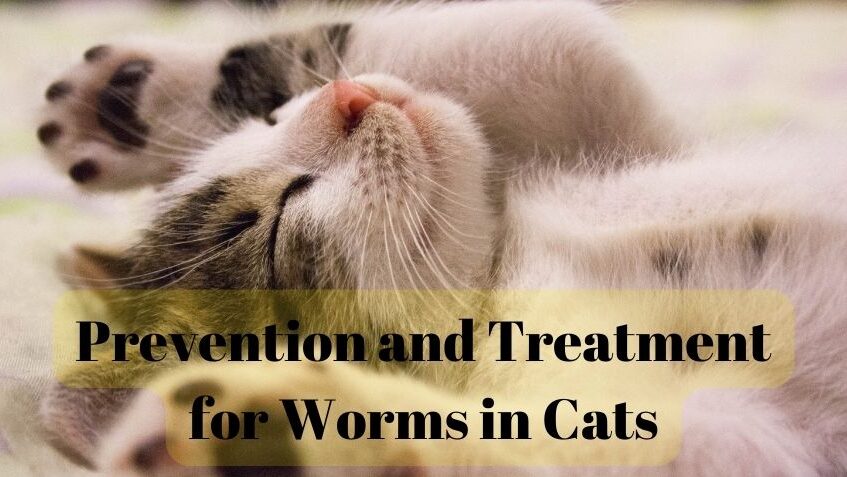Prevention and Treatment for Worms in Cats
As a pet parent, you must be worried about you paw friend and you must be asking if worms painful for cats?
Worms in cats can potentially cause pain. The migration of larvae through the liver, stomach, eye, or lungs would cause discomfort as the affected tissues become inflamed from the disruption.
This could present as:
- Belly pain, including gastritis due to inflammation of the stomach lining (potential nausea, vomiting, loss of appetite, food aversion)
- Eye irritation (excessive rubbing of the eye, squinting, or discharge)
- A change in your cat’s breathing rate/pattern
The accumulation of fluid from protein loss can cause a distended abdomen in some animals, which can be uncomfortable due to the swelling of the abdominal muscles and skin.
It can also cause breathing issues if too much abdominal fluid is pressing on the diaphragm and restricting the normal lung capacity for proper breathing.
Can Humans Get Worms from Cats?
Yes, humans can contract worm infections from cats by coming into direct contact with contaminated feces or soil.
Common modes of transmission include:
- Children playing in sandboxes where cats have defecated
- Walking barefoot through contaminated soil
- Gardening in soil without wearing gloves
Accidental ingestion of contaminated soil or feces can happen in humans as well, so good hygiene practices are vital for preventing transmission from cat to owner.
How to Get Rid of Worms in Cats
There are several “home” remedies that claim to be effective in treating and preventing worms in cats, including garlic, apple cider vinegar, pumpkin seeds, carrots, and turmeric.
However, attempting to treat your cat with over-the-counter remedies or natural remedies for worms in cats is never recommended.
While it may seem like a faster and cheaper alternative to visiting your veterinarian, there is NO guarantee that those products are safe or effective in treating any type of medical condition, and they could actually be harmful to your cat.
Here are some effective and vet-approved treatments for worms in cats.
Dewormers
Your veterinarian may prescribe an oral or injectable dewormer that will kill the adult and larval worms in the intestine at the time of diagnosis.
Broad-spectrum prescription medications such as Panacur (fenbendazole) and Drontal Plus (pyrantel, praziquantel, fenbendazole) can be used to treat hookworm, roundworm, whipworm, and tapeworm infections, but they must be carefully administered to your cat according to your veterinarian’s instructions.
Your cat may require multiple doses to kill any larvae that may have hatched after the first dose was given.
Praziquantel is also available as a one-time injectable treatment for tapeworm infections, which works by paralyzing and dislodging the sucker of the worm from the intestinal wall, allowing the worms to be passed in the feces.
Your veterinarian may also recommend starting your cat on a monthly topical or oral flea prevention, since tapeworm infections can recur if there are fleas in your home environment.
What Happens if Worms Go Untreated in Cats?
Worm infestations that are left untreated can be dangerous, even fatal, for your cat.
Migration of larvae through the organs and tissues of the body as they make their way to the intestine could result in severe skin infections, blindness, convulsions, or pneumonia, depending on the path of larval migration.
Ongoing losses of blood and vital nutrients, which should be absorbed by the intestines, can result in progressive anemia, weight loss, dehydration, and death.
How to Prevent Worms in Cats
Worm infestations in cats and transmission to children and adults can be prevented through good hygiene practices and the year-round use of heartworm, intestinal worm, and parasite prevention.
For indoor cats, cleaning the litter box on a daily basis, as well as changing out the litter and scrubbing the litter box on a regular basis is vital for minimizing exposure to contaminated feces.
For outdoor cats, regularly scooping feces from the yard, sandbox, and flower beds will minimize the potential for propagation of the parasite life cycle.
There are several “home” remedies that claim to be effective in treating and preventing worms in cats, including garlic, apple cider vinegar, pumpkin seeds, carrots, and turmeric.
However, attempting to treat your cat with over-the-counter remedies or natural remedies for worms in cats is never recommended.
While it may seem like a faster and cheaper alternative to visiting your veterinarian, there is NO guarantee that those products are safe or effective in treating any type of medical condition, and they could actually be harmful to your cat.
Visit your veterinarian as early recognition, diagnosis, and treatment are essential.
You may also visit – https://www.facebook.com/angkopparasahayop




